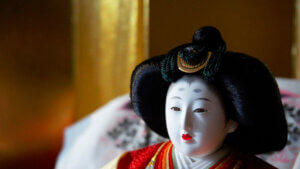
Greece, officially called the Hellenic Republic, is known for its ancient civilizations. With this article we explore the mythology and funeral practices of Ancient Greeks. For instance, that includes notions of the impurity of death and even a Festival for the Dead. We then focus on the lesser known modern Greek death customs. That involves death superstitions, Orthodox funerals and regional grief variations. Both Ancient and modern Greeks focus very much on taking care of the dead and the living. After all, the Greek word for funeral (‘κηδεία’) derives from the Ancient Greek verb ‘kideuo’, meaning to (take) care of. Finally, we discuss Greece’s own Blue Zone on the island of Ikaria.
Ancient Greece was for most of its history divided into city-states. That is a political system according to which every city was an independent state. However, they all shared a similar language and religion. Therefore, religious – or mythological to us – views of death looked quite alike across Ancient Greece.
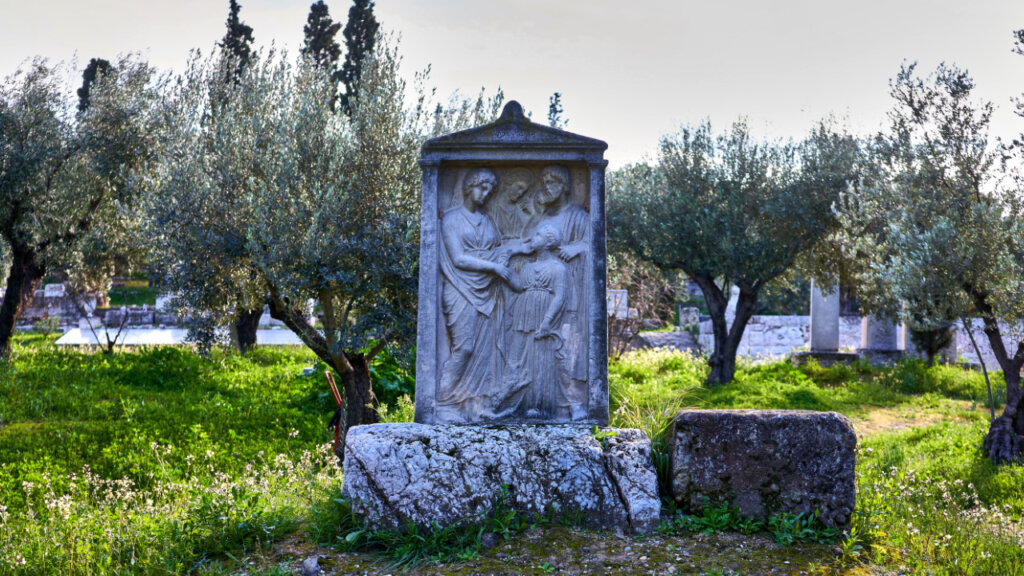
Most people know that Ancient Greeks practiced polytheism, meaning they had many Gods. Additionally, depending on the region or certain Gods had a higher or special status. However, Gods and lesser deities connected to death were present throughout all Hellenic regions. Moreover, death itself was a God called Thanatos – quite literally meaning death in Greek. However this deity was relatively obscure and not as prevalent as the ruler of the underworld Hades (‘Άδης’) or even Hermes (‘Ερμής’). According to Greek traditions, Hermes brought the souls of the dead to Charon who was the ferryman of the underworld. Charon then sailed the Acheron River to deliver the souls to Hades.
However, not everybody was able to sail with Charon. If the relatives of the had not offered the appropriate death honors to the deceased, Charon just refused to carry the soul to its final destination. Ancient Greeks considered it necessary to put a silver coin (‘obolos‘), under the tongue of the corpse.
In addition to all the above, Acheron was just one out of five Rivers of Hell. The other ones were the River of Horror (‘Styx’), the River of Lamentations (‘Cocytus’), the River of Fire (‘Phlegethon’) and the River of Forgetfulness (‘Lethe’). The names of the rivers reveal how Ancient Greeks saw death, acknowledging the complexity of emotions present when grieving. Moreover, researchers support that these rivers correspond to actual rivers, still to be found in modern-day Greece. For instance, the River Styx is said to be the modern-day Greek river Mavronéri (‘Μαυρονέρι’, meaning, Blackwater). It is also worth mentioning that to Ancient Greeks, these rivers separated the dead and the living.
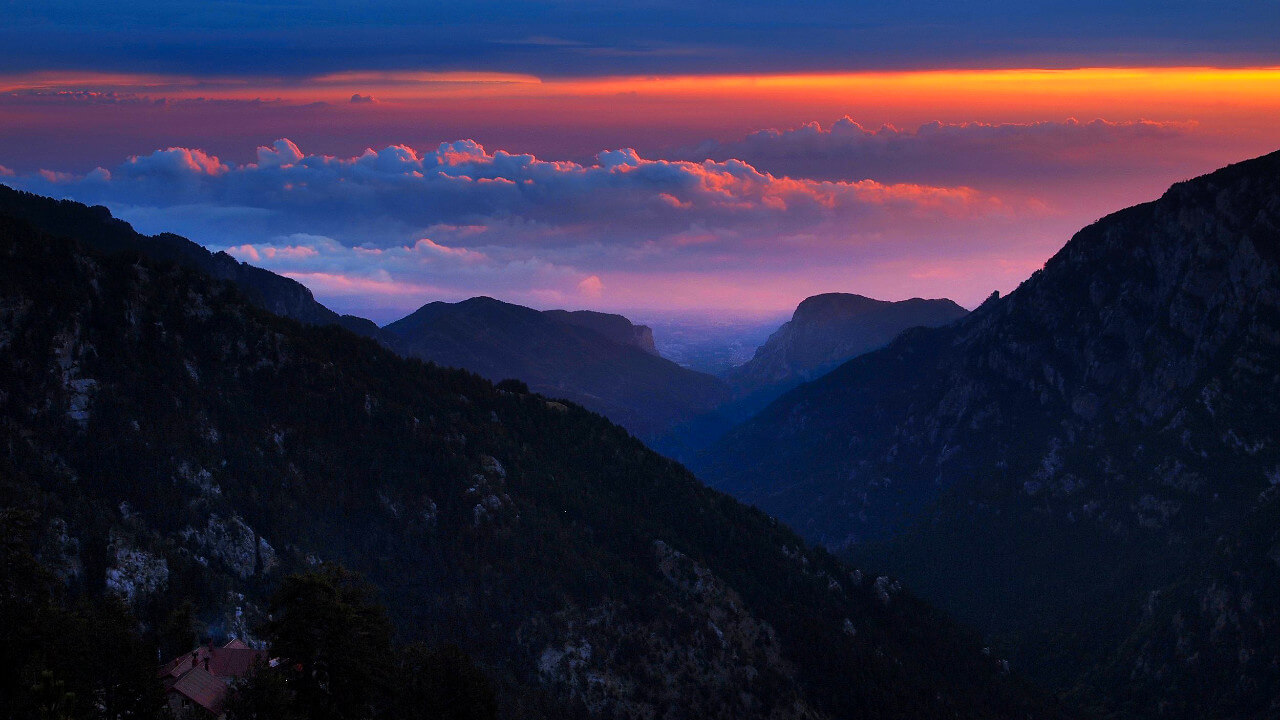
Prior to 1100 BC, Ancient Greeks used group graves to bury their dead. Although around that time there was a shift to individual tombs, not every city-state followed the same trends. For example, Athens practiced cremation and used urns to keep the ashes. Gradually grave goods became less lavish but remained present. At the same time, cemeteries started expanding. Researchers have also connected that to the rise of Democracy. Their argument gets more credibility since the opposite also occurred: The rise of the Macedonian and Alexandrian Empires of Northern Greece saw a turn to more aristocratic values. As a result, tombs became again more elaborate, with vaults of grave goods, offerings and extravagant decorations.
Regardless of the period though, funerary vases were a staple of Ancient Greek funerals. Although they looked like normal vases for liquids, they actually functioned as grave markers. Moreover, they usually were symbols of the status of the deceased. Finally, in certain cases the Greeks also left instructions to their deceased so they can navigate the underworld.
Women had a crucial role at Ancient Greek funerals. For example, they were the ones that put the coin under the deceased tongues. Additionally, women had to clean the body, washing it with hot water and dressing it appropriately. They also made special honey pies that the dead had to present to Cerberus. Cerberus, often referred to as the Hound of Hades, was a three-headed dog that guarded the gates of the underworld. The honey pies were supposed to calm Cerberus, so the soul can pass through.
And although women were very involved with the funeral, the same does not apply to priests – or priestesses. Specifically, it was dangerous for priests to enter the house of the dead, or even be present at any funeral rites. This is a direct result of the Ancient Greek notion of death being spiritually polluting.
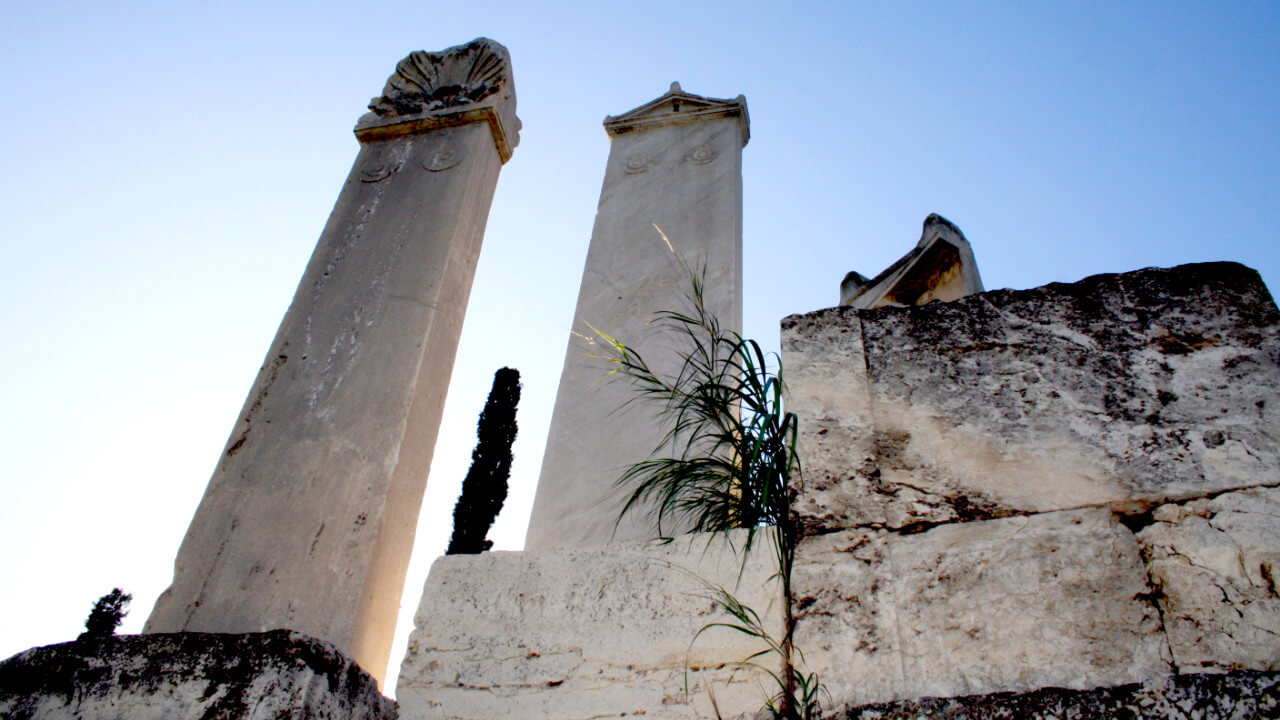
Ancient Greeks believed that even Gods could be polluted by the impurity of death. Therefore, anything or anyone related to the Gods had to stay away from the site of the death and the dead themselves. Therefore, priests and priestesses were absent during any funeral rites since they were closer to the Gods. Moreover, there were even inscriptions at Ancient Greek temples warning people that came in touch with the dead recently that they were not welcome.
Burning the body or burying it was crucial for Ancient Greeks. They also believed that throwing even a handful of soil over the deceased could prevent the corpse from turning into a vengeful being of darkness. After all, this is what Antigone does for her brother’s corpse in Sophocles’ masterpiece.
Additionally, Ancient Greeks placed a special vase called ‘ardanio’ next to the entrance of the house of the deceased. They also filled the vase with water from the neighbors and everybody coming out of the house had to wash themselves in this water. As a result they believed they were preventing the spread of the impurity of death. Moreover, funerals often took place in the night since Ancient Greeks believed that even the sun could be polluted by the deceased if its rays touched the body. Finally, the day after the funeral, relatives cleansed the house with seawater.
Ancient Greek funerals usually had three stages. These took place during multiple days and followed specific protocols, so to speak.

We already mentioned that women were cleaning and preparing the body. After that other relatives and friends came for a viewing the following day. Women were also close to the bier, loudly moaning and lamenting. That often was quite physical since they pulled their hair and stroked their breasts. In other words, they were trying to express and match their emotional pain with a physical counterpart. The main figure of grief was the wife or mother of the deceased. This part of the funeral, called Prothesis, originally took place outdoors but gradually turned into an indoors ritual.
The procession started before the dawn of the third after death. In Athens there was also a funeral oration (‘epitaphios logos’) that was a kind of eulogy. Athenian eulogies became famous spreading across the Hellenic peninsula and setting the standard for these speeches. Demosthenes famously complimented Athenians for their elaborate speeches and especially for using the occasion to praise the dead for their achievements in life.
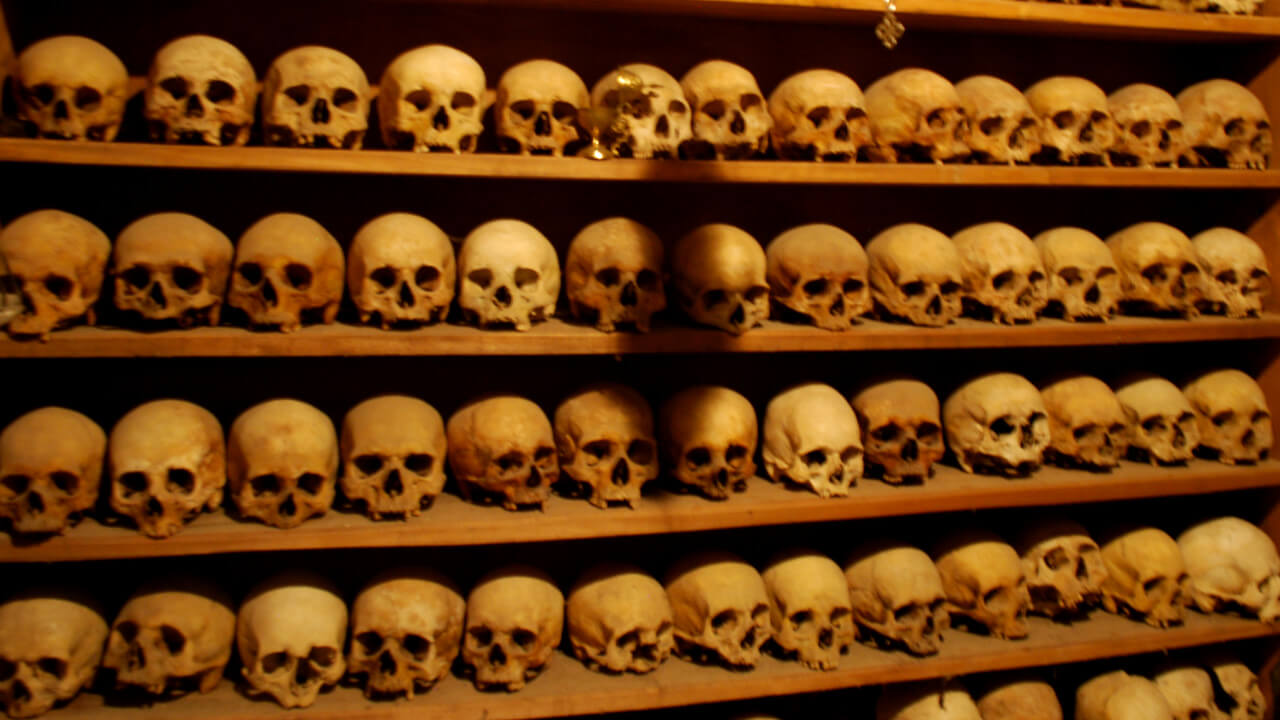
Although animal sacrifices were rare, other offerings were not. For example, Greeks would often use a lock of hair of the mourning relative. Only one of the closest loved ones of the deceased was to make these offerings. Additionally, liquids were of importance including milk, water, wine, honey, oil and various perfumes. Ancient Greeks poured those on the grave or next to the funerary stele.
A stele (stelai in plural) was a funeral construct – picture a small obelisk. Furthermore, these stelai were often adorned with sculptures of athletes and in later centuries families. After the burial ceremonies were complete, Ancient Greeks had a feast in honor of the dead. During this, they were praising the dead since they believed that their soul had not yet departed to the underworld.
Ancient Greeks were also honoring their dead during the Anthesteria Festival at the end of February. This multi-day Festival was an opportunity for Greeks to celebrate many things. For example, the first day was focused on honoring Dionysus. As a result, all household members, including slaves, drank jars of wine from last year. The second day focused on a similar theme, with wine flowing even stronger. It was the third and final day that was dedicated to the dead.
The day was called Chytroi, and it was a Festival of the Dead. All the offerings were directed to Hermes, and specifically his capacity as the Guide of Souls (‘Psychopompos’). It was not allowed to make offerings to any other Olympian on that day. Additionally, there were no performances in the theater commemorating the occasion. Ancient Greeks also made a special stew that no one was to consume since it was meant for the dead.
This way the spring could start with no bad luck and misfortune since the dead, the living and the Gods had been satisfied.
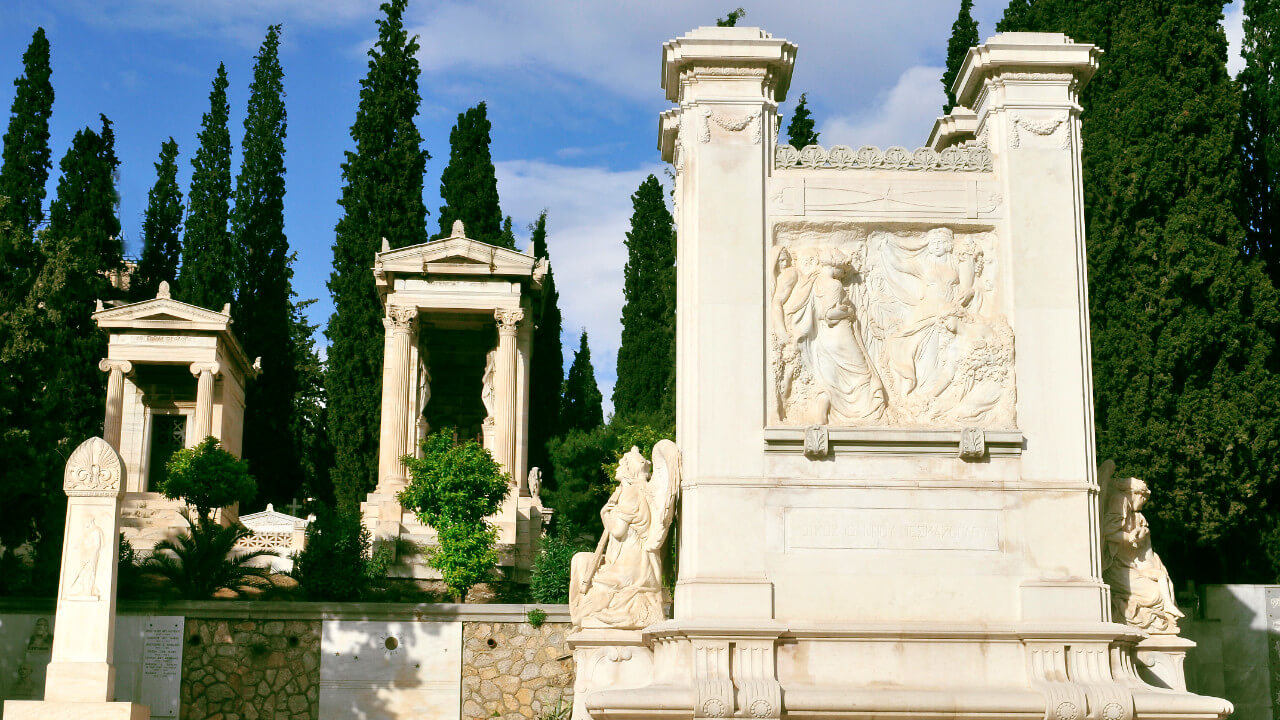
Religion, and especially Orthodox Christianity, in present day Greece is defining funerary practices and traditions. However, a great number of these traditions and customs originate from ancient times. For instance, the significance of liquids is still present. That includes relatives washing the dead as well as themselves after they are done preparing the body. Oil and wine are important too.
Following both Orthodox and Ancient Greek beliefs, Greeks often see death as a synonym for suffering and pain. In the words of a Greek researcher:
"Death itself is a living experience of people left behind”
- Mystakidou et al., 2004-2005, p.29
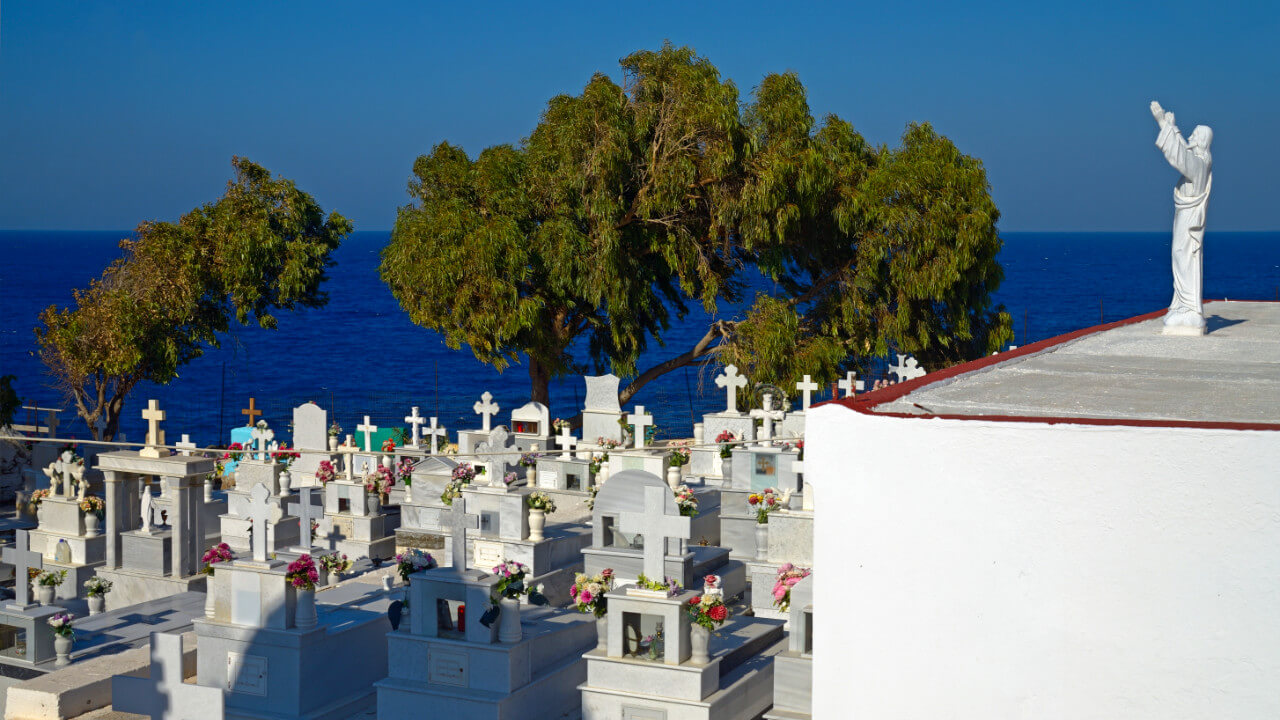
Due to that, Greeks often avoid talking about death. After all there is a superstition that speaking of death in one’s house is almost the same as inviting death to the house. This is far from the only death superstition in modern Greece however.
Greeks residing in urban centers are less likely to believe in superstitions. Additionally, certain communities or regions have their own customs and superstitions. Here is a list of various Greek death superstitions:
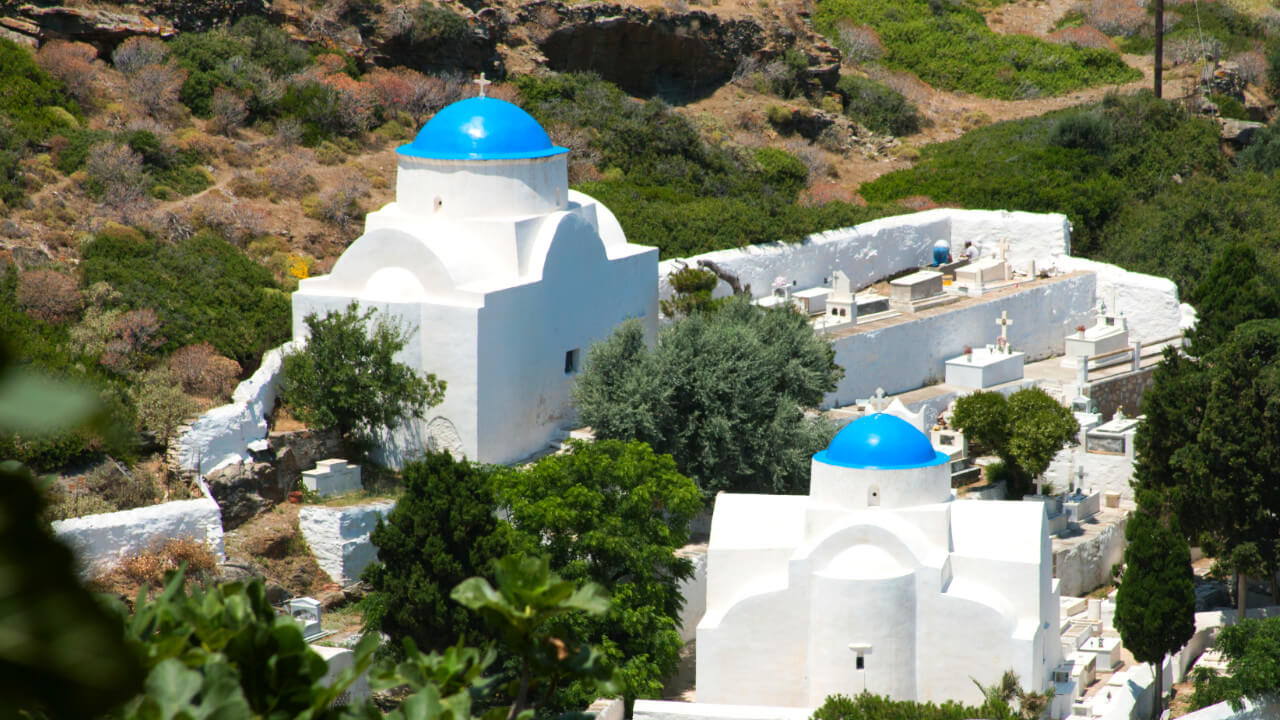
Modern Greek funerals are almost always Orthodox. Both the wake and the funeral are actually public events which means that anyone can join. Furthermore, Greek funerals almost always include a coffin. Additionally, the coffin usually remains open unless the body has been damaged. The cover of the coffin is often placed next to the entrance of the house, signifying death in this household.
Once in the church, the family is seated next to the coffin. Additionally, an interesting feature is that once the eulogy is complete, close relatives are invited to kiss the dead on the forehead. This also takes place in the church, in front of everyone attending. After all it signifies a public farewell to the deceased. After the ceremony is complete, the close relatives line up next to the entrance of the church so everyone can offer their condolences. This can be a very lengthy process.
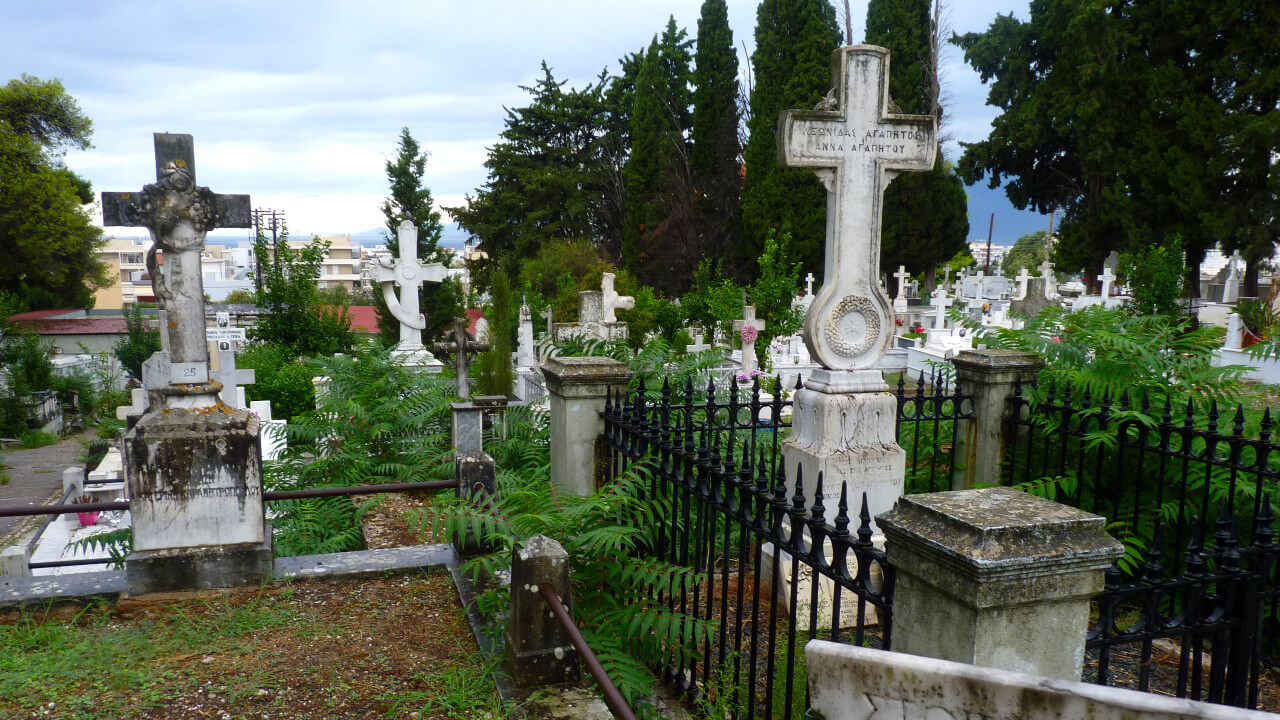
After this, relatives, close friends and acquaintances regroup so they can have the so-called ‘coffee of consolation (“καφές της παρηγοριάς”). This is a chance for the family to offer consolation and solace to each other. Very often this is also an opportunity for the attendees to share stories and it may last three or even four hours. It is worth mentioning that such chores are almost meant to function as a distraction for the family so they are not in touch with their grief.
Since Greeks believe that the soul remains on earth for 40 days after death, corresponding customs have developed. For example, people lit a candle at home for this duration.
Additionally, Greeks also organize rituals and commemorations very diligently. Such rituals, called ‘mnemosyna‘, include special prayers by an Orthodox priest. These take place on the third, ninetieth, twentieth, fortieth, and then six and nine months after death. Finally, they throw special rituals on the one, three and five year death anniversary. During these days, relatives prepare sweet boiled wheat (‘Koluva’).
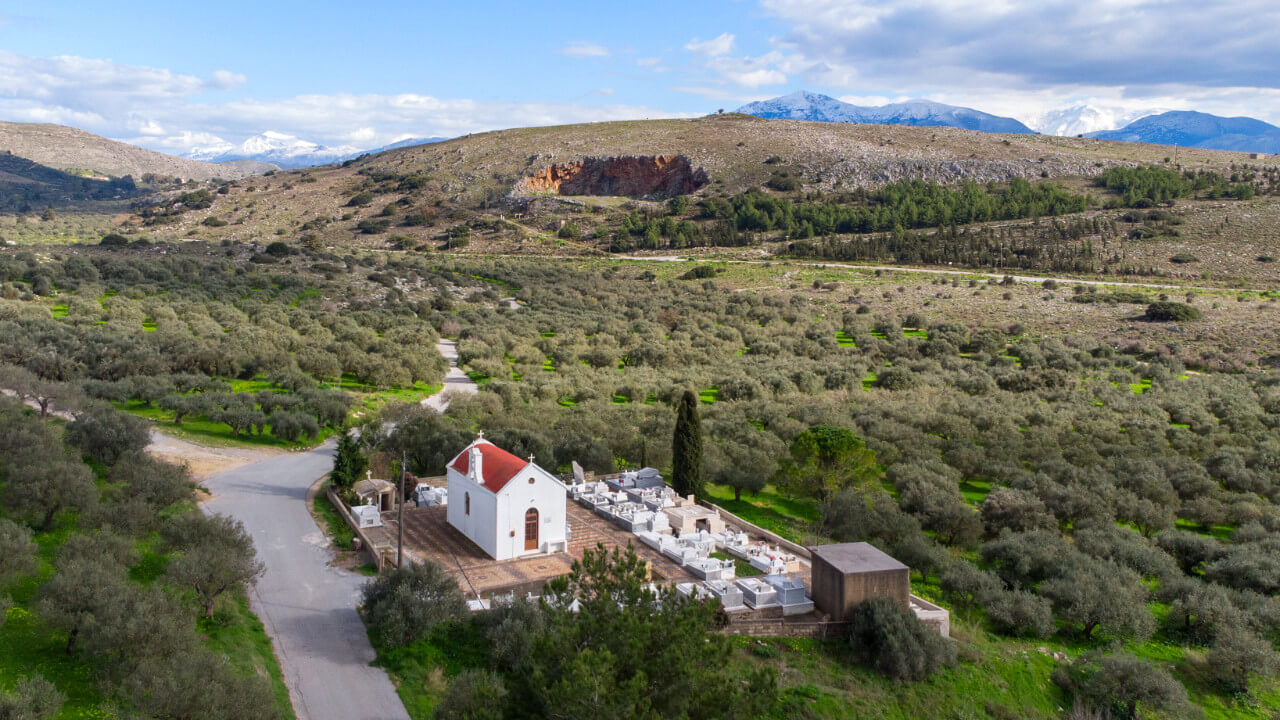
In a Southern Greek district called Mani, there is a very particular custom. Relatives may start heading to the house of the deceased while screaming their name.
Additionally, Crete, Greece’s largest island, is home to many unique traditions. Almost everyone on the island does not fully celebrate Christmas and Easter the following year. For instance, if a man dies, the wife and the sisters of the dead cut their hair as a sign of pain and resilience. They then place the hair on the dead body. In another area called Sfakia, if a son dies, his father may never shave again, while the mother may only wear black for the rest of her life. Furthermore, in Agioupoli, Southern Crete, ghost marriages take place. According to local customs, if an engaged man dies, his fiancee has to cut her hair too. In addition to that though, she will marry the next son in line, if the deceased had any.

According to a 2009 research, Ikaria has the highest ratio of 90 years old habitats in the world. Statistics show that one out of three Ikarians make it to their nineties, while they exhibit almost no dementia. Additionally, locals have particularly low rates of both heart diseases and cancer.
Due to the location of their villages on mountain sides, Ikarians are used to everyday activity. Another factor that potential enhances their well-being is their sense of community and their diet. Regarding the latter, researchers have found that it is very rich in olive oil, fruits and vegetables. A potential game changer is also the Ikarians’ tea consumption. They brew their own herbal infusions two times a day, everyday. Moreover, research has shown that this tea lowers blood pressure. Could that be their secret for lower heart disease rates? Interestingly, this is not the case in other blue zones such as Okinawa, Sardinia or Costa Rica.
We hope you learned something new regarding this country’s death practices!
If you want know more about funeral traditions of ancient civilizations, feel free to check out our Ancient Egypt and Roman Empire articles! Moreover, you can read more on death superstitions in Russia and France.
The average mixed death rate of Greece is 11,7 per 1.000 people (2019). This year’s rate is the highest since 1960.
Most funerals take place within 12 to 24 hours after death. Additionally, it is only in rare that funerals take more than that, usually due to an autopsy.
A staggering 90% of all Greeks are Christian Orthodox (2015). Furthermore, Orthodox Christianity is constitutionally considered the “prevailing religion”, and thus Greece is not a secular country. Especially after the influx of immigrants from the Middle East, Islam is a minority religion (2%), surpassing even Catholicism in Greece. Buddhist immigrants working in Greece were usually sent back to their home country to be cremated, due to cremation being banned in Greece until 2006. Finally, in recent decades Hellenic Paganism has experienced an increase of followers. This refers to the original Ancient Greek Pantheon.
The rate of utilized organs in Greece was 4,40 per million people (2020). That corresponds to 48 actual donated organs that doctors used for transplantations.